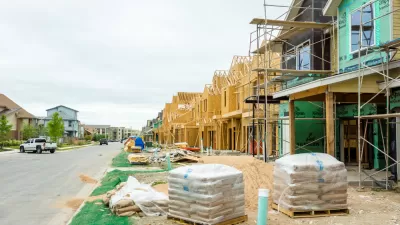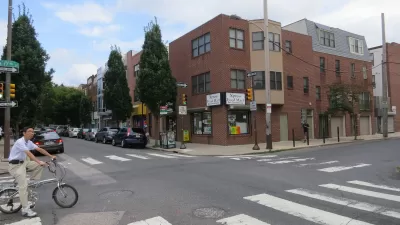As cities across the country consider ways to limit teardowns and large home construction in established neighborhoods, Anthony Flint argues that communities should be flattered by "mansionization" and accommodating to this form of smart growth.
Flint has some contrarian advice for a town just north of Boston considering zoning controls or other measures to prevent "mansionization": "Don’t stand in the way. Be flattered that the market is recognizing your neighborhoods and prime locations. And most important of all, be proud that what’s happening is a form of smart growth."
He cites the potential for energy savings and multigenerational housing as two advantages of the mansionization and teardown phenomenon, but is particularly enthusiastic about the element of location. "Another way to describe the phenomenon is 'infill redevelopment.' Builders are essentially re-using an established parcel in an already developed neighborhood. That’s a far greener step than building a true McMansion out in the cornfields. It’s the essence of smart growth – build in the places already built up, and leave the greenfields of the periphery alone."
FULL STORY: In Defense of 'Mansionization'

Maui's Vacation Rental Debate Turns Ugly
Verbal attacks, misinformation campaigns and fistfights plague a high-stakes debate to convert thousands of vacation rentals into long-term housing.

Planetizen Federal Action Tracker
A weekly monitor of how Trump’s orders and actions are impacting planners and planning in America.

Chicago’s Ghost Rails
Just beneath the surface of the modern city lie the remnants of its expansive early 20th-century streetcar system.

Bend, Oregon Zoning Reforms Prioritize Small-Scale Housing
The city altered its zoning code to allow multi-family housing and eliminated parking mandates citywide.

Amtrak Cutting Jobs, Funding to High-Speed Rail
The agency plans to cut 10 percent of its workforce and has confirmed it will not fund new high-speed rail projects.

LA Denies Basic Services to Unhoused Residents
The city has repeatedly failed to respond to requests for trash pickup at encampment sites, and eliminated a program that provided mobile showers and toilets.
Urban Design for Planners 1: Software Tools
This six-course series explores essential urban design concepts using open source software and equips planners with the tools they need to participate fully in the urban design process.
Planning for Universal Design
Learn the tools for implementing Universal Design in planning regulations.
planning NEXT
Appalachian Highlands Housing Partners
Mpact (founded as Rail~Volution)
City of Camden Redevelopment Agency
City of Astoria
City of Portland
City of Laramie




























